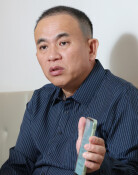False online data on listed companies cause huge losses
False online data on listed companies cause huge losses
Posted November. 12, 2011 05:44,
With the Internet a massive pipeline for distributing rumors, the financial investment market is getting increasingly polluted. Forces that seek profits via lies are exploiting the Web, and profit-hungry investors are repeatedly falling victim to fraud.
Certain companies are also joining the foray to rip off investors. Lies stemming from greed are destroying the Korean economy.
○ 67 percent of delistings due to lies
Gloworks, a KOSDAQ-listed company, drew keen attention from the Korean securities market due to its bid to develop gold mines in Mongolia in 2009. Its stock price soared 327 percent from 545 won (50 cents) per share in April 2009 to 2,330 won (2 dollars) on Sept. 10. But the news on the gold mine development was a fabrication.
The companys CEO was arrested in April this year on the charge of earning illegal profits of more than 70 billion won (622 million dollars) by rigging stock prices through fake disclosure. The company was delisted in June and investors took the brunt of the losses.
As many as 15 companies alone have been caught for embezzling money through fake information on resource development since 2007, with 10 of them being delisted.
The Dong-A Ilbo`s business desk analyzed on Friday why 239 companies had delisted since 2009. Of these, 161 or 67.4 percent were delisted due to auditors rejection of audit results and lack of managerial transparency. That is, they were delisted because managerial situations, including financial statements submitted by those companies, were fabricated.
A source at the Korea Exchange said, These companies were caught while constantly lying to investors.
The public disclosure system, which requires companies to publicize major issues to investors, is not functioning properly, either. The number of cases in which companies fail to disclose or change the content of their public disclosures is growing. The number of false public disclosures in the main stock market rose from 15 in 2009 to 24 in 2010 and 30 this year through Tuesday.
The number of false public disclosures in the KOSDAQ market also increased from 69 in 2010 to 99 this year. In most cases, companies failed to inform investors of incidents that are fatal to a company`s value, including heavy losses caused by investment in derivatives products and embezzlement.
○ Poorly informed individual investors suffer most
In June, a photo instantly spread throughout the Internet such as wildfire. A man with his facial image blurred was seen going mountain hiking with Moon Jae-in, chairman of the Roh Moo-hyun Foundation.
The photo read "The middle-aged man was the CEO of Daehyun, a listed company." Since Moon began to draw attention as a potential presidential candidate at that time, the apparel maker saw its share price soar from 1,200 won (1.10 dollars) per share on June 30 to 3,860 won (3.43 dollars) on Aug. 24.
After the man in the photo was found not to be the CEO, the company`s share price plunged. This happened only after the forces that circulated the photo and spread lies went into hiding.
Likewise, the way lies are circulated is evolving as well. In the past, rumors were spread through "information bulletins" in the securities market, which were compilations of unconfirmed rumors floating in the stock market. Now, lies are spread by elevating the rankings of words searched on Web portal sites.
Given that lies on the stock market are rampant, individual investors are suffering severe damage and taking the heat.
In February last year, the operator of a public sauna started investing in C-Motech, an LED parts maker. He participated in a capital increase with consideration in January this year, and ended up investing more than 100,000 dollars.
He had conviction in the stock because a stock investment broadcaster had recommended "buy" for the company, and the brokerage house that served as lead manager for the capital increase also presented highly promising data.
C-Motech attracted 28.6 billion won (25.4 million dollars) through the capital increase, but problem surfaced soon after. The company`s stock trading was suspended due to malfeasance by its top managers and suspected embezzlement two months after the capital increase. Delisting soon followed.
Having suffered more than 100,000 dollars in losses due to lies, the public sauna operator cannot afford to renew rental of his building since his landlord is demanding higher rent.
Among the investors who participated in C-Motechs capital increase with consideration, 186 filed a collective lawsuit against Dongbu Securities, the lead manager of the capital increase, on Oct. 13.
Hannuri Law, the legal counsel for the investors, said, More than 3,000 people incurred losses and they are believed to have collectively lost more than 10 billion won (8.9 million dollars), adding, The lead manager was negligent in its responsibility to warn investors, with some of the information in investors guides proven to be fake.
Many also say the punishment for "fake or unfaithful public disclosures" should be toughened but the regulatory system is moving in the opposite direction. The three-strike policy, which requires automatic delisting of a company caught three times or more for false public disclosure, was revoked in 2006 due to an allegedly heavier burden on companies.
Park Gyeong-seo, a business management professor at Korea University in Seoul, said, Outside directors and auditors have a limited capacity to survey and catch irregularities committed by companies, adding, Korea should move toward toughening punishment after the occurrence of irregularities, including strong legal action against top managers of such companies as in the U.S. and the U.K.
libra@donga.com teller@donga.com
Headline News
- N. Korea conducts ICBM test ahead of U.S. presidential election
- Samsung Electronics to expand 5th Gen HBM Sales in Q4
- Gov’t flags possible tax evasion among pension exemption applicants
- Draft of U.S.-brokered 60-day truce between Israel and Hezbollah leaked
- Half of working seniors earn less than 1 million won per month







